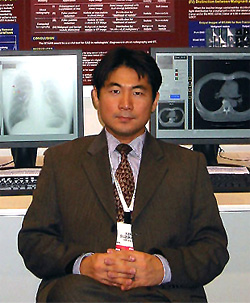Biography
Dr. Kenji Suzuki, Ph.D. (by Published Work; Nagoya University) worked at Hitachi Medical Corporation, Japan, Aichi Prefectural University, Japan, as a faculty member, and in Department of Radiology, University of Chicago, as Assistant Professor. In 2014, he joined Department of Electric and Computer Engineering and Medical Imaging Research Center, Illinois Institute of Technology, as Associate Professor. In 2017, he was jointly appointed in World Research Hub Initiative at Tokyo Institute of Technology as Full Professor (Specially Appointed). He published more than 320 papers (including 110 peer-reviewed journal papers). His papers were cited more than 8,500 times by other researchers. He has an h-index of 42. He is inventor on 30 patents (including 13 granted patents), which were licensed to several companies and commercialized. He published 10 books and 22 book chapters, and edited 13 journal special issues. He was awarded/co-awarded more than 25 grants as PI including NIH R01 and ACS. He served as the Editor of a number of leading international journals, including Pattern Recognition and Medical Physics. He served as a referee for 80 international journals, an organizer of 30 international conferences, and a program committee member of 150 international conferences. He received 25 awards, including 3 RSNA Certificate of Merit Awards, IEEE Outstanding Member Award, Cancer Research Foundation Young Investigator Award, Kurt Rossmann Award for Excellence in Teaching from Univ of Chicago, IEICE 2014 Best Journal Paper Award, EANM Most Cited Journal Paper Award 2016, and 2017 Albert Nelson Marquis Lifetime Achievement Award
Research Interest
The long-term goal of Dr. Suzuki’s research is to develop and understand computational intelligence that learns, from data and examples, experts’ knowledge and skills in understanding images in order to make smart decisions. To approach his goal, he believes that the development of sophisticated machine-learning and image-analysis techniques, their theoretical backups, and an understanding of experts’ decision-making process and of the human visual system are essential. Areas of his interest include machine/data learning in biomedical imaging, computer-aided detection and diagnosis of lesions in biomedical images, and biomedical image processing and analysis, especially machine learning inspired by the human visual system for image processing and pattern recognition such as image-based machine learning and deep learning, and its applications in biomedicine.
